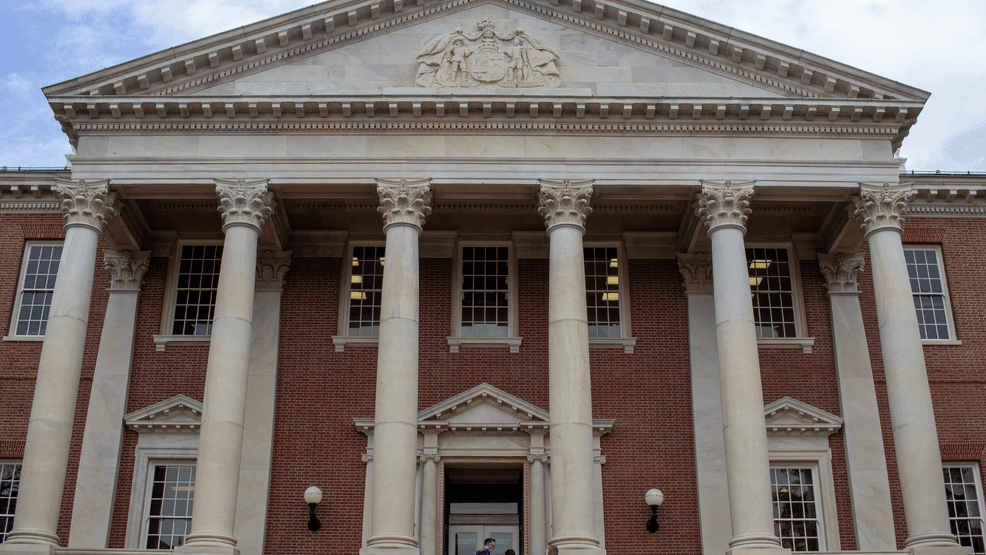
ANNAPOLIS, Md. (WBFF) — Gov. Wes Moore remained silent on Thursday about whether he will sign an act to establish a Maryland Reparations Commission and legislation allowing violent offenders a “second look” for early release, both of which have advanced to his desk.
A day before the Maryland General Assembly passed two priorities of the Legislative Black Caucus, the governor was in New York City to participate in what his office described as a “fireside chat” with Rev. Al Sharpton. The event marked the kickoff of the National Action Network’s annual convention, an advocacy group led by Sharpton.
“Maryland incarcerated more African American young men and boys between the ages of 18 and 25 anywhere in the country. Number two, by the way, was Mississippi,” Gov. Moore said. “We can both make sure that our communities are safe and also address the disproportionate incarceration of our black boys and men inside the criminal justice system.”
[N]ot only have we been able to address, with a real sincerity, not only what has been happening with over-incarceration, but if you look at violent crime rates, Maryland now has one of the most precipitous drops of violent crime anywhere in the entire country,” Gov. Moore added.
Sen. C. Anthony Muse, D-Prince George’s County, echoed many of the statements that the governor broadly made in New York City on the Senate floor during a final debate on Thursday concerning the Maryland Second Look Act.
“I hear a lot of talk about the worst of these and hideous crimes,” Sen. Muse said. “[T]his bill is not just about rehabilitation but taking a look at people to determine if their sentences were actually just.”
RELATED | Md. bill allowing violent offenders to seek early release inches forward, Dems break rank
In its approved form, the Second Look Act will allow judges to release violent offenders serving long prison sentences if their convictions occurred between the ages of 18 and 25.
The House debated the measure for over two hours during a Saturday marathon session in mid-March. House Republicans introduced 11 amendments aimed at narrowing the law’s scope. More than a dozen House Democrats supported many of the proposed amendments, although none were passed. The final House vote also encountered bipartisan opposition.
A similar debate occurred on Wednesday in the Senate. An amendment proposed by Sen. Jack Bailey, R-Calvert and St. Mary’s Counties, which prohibits individuals convicted of murdering a first responder from receiving early release under the act, was successfully adopted.
[W]e’re not saying ‘take a look always at the worst’ because sometimes the victims are those actually incarcerated,” Sen. Muse said.
Despite facing bipartisan opposition in the Senate, the measure was ultimately passed and sent to Gov. Moore for his signature on Thursday. Senate Minority Whip Justin Ready, R-Carroll and Frederick Counties, told Spotlight on Maryland after the vote that he is urging the governor to veto the measure.
“We already allow many different opportunities for someone who is convicted of a crime to have an opportunity to show they have reformed and get out,” Sen. Ready said. “This would allow people who have been convicted of very serious crimes, including murder, another look at their sentence even after they have been denied parole multiple times.”
Meanwhile, Del. Caylin Young, D-Baltimore City, told Spotlight on Maryland on Thursday that he is pleased a bill establishing the Maryland Reparations Commission has passed and is now heading to the governor for final approval.
I think it’s been needed. We have needed a reparations commission for decades at this point,” Del. Young said. “We’re in a place now, in the state of Maryland, where we have leadership that is of the race and of the community that has been impacted historically.”
“This is not a conversation about paying people today, but it is a conversation about what are the appropriate remedies,” Del. Young added.
The bill before Gov. Moore would require the commission to study and provide recommendations regarding the appropriate benefits for individuals whose ancestors were enslaved in Maryland. The bill’s language also incorporates a provision to assess the feasibility of direct financial payments, or restitution, to individuals who may have been affected by “certain inequitable government policies.”.
RELATED | Maryland reparations bill inches forward as Gov. Wes Moore dodges questions on initiative
Spotlight on Maryland planned to ask Gov. Moore about the reparations legislation and the Second Look Act during a scheduled media availability on Thursday afternoon. However, the governor’s team abruptly canceled his appearance, saying that they would release a statement at a later time.
The governor also ignored Spotlight on Maryland’s attempts to get comment on Monday while he served drinks to patrons at Pickles Pub outside Camden Yards before the opening day of the Baltimore Orioles baseball season. Spotlight on Maryland was seeking answers regarding both bills, which advanced to his desk on Thursday, as well as other legislative priorities.
Spotlight on Maryland sent Gov. Moore questions on Thursday afternoon after his availability was canceled. Those questions included:
- Will the governor sign the Second Look Act and the bill to establish a reparations commission?
- How will the state of Maryland pay for findings from the reparations commission?
- Is the governor concerned that the Second Look Act may negatively harm public safety?
The email request was neither acknowledged nor answered.
Spotlight on Maryland pressed Del. Young, a member of the Legislative Black Caucus, on whether the two bills could act as a political talking point for Gov. Moore’s potential future ambitions, including a possible run for the White House.
That’s not for me to determine,” Del. Young said. “I will say this, I said this directly to the governor: He is strongest when he moves the boldest.”
“If the governor is able to help us achieve this, not only if it’s pay for it, whether it’s monetary or something else, if we are able to find something appropriate, and execute on it in a way where it has a positive impact on our state, I certainly think that’s a platform anyone can run on,” Del. Young added.
The Maryland legislature approved this week a $1.68 billion in tax and fee increases for the fiscal 2026 budget, marking the largest revenue increase in state history. The nonpartisan Maryland Department of Legislative Services projects that the state could face a structural deficit of up to $6.7 billion by fiscal year 2028.
Follow Gary Collins with Spotlight on Maryland on X. Do you have news tips on this story or others? Send news tips to gmcollins@sbgtv.com.
Spotlight on Maryland is a collaboration between FOX45 News, WJLA in Washington, D.C., and The Baltimore Sun.


